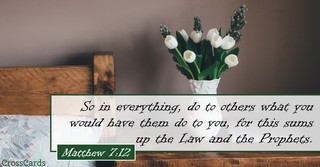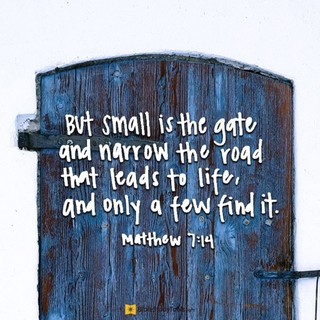- Recent Translations
- All Translations
Matteo 7
Share
Settings
Matteo 7 Commentary
Chapter 7
Christ reproves rash judgment. (1-6) Encouragements to prayer. (7-11) The broad and narrow way. (12-14) Against false prophets. (15-20) To be doers of the word, not hearers only. (21-29)
Verses 1-6 We must judge ourselves, and judge of our own acts, but not make our word a law to everybody. We must not judge rashly, nor pass judgment upon our brother without any ground. We must not make the worst of people. Here is a just reproof to those who quarrel with their brethren for small faults, while they allow themselves in greater ones. Some sins are as motes, while others are as beams; some as a gnat, others as a camel. Not that there is any sin little; if it be a mote, or splinter, it is in the eye; if a gnat, it is in the throat; both are painful and dangerous, and we cannot be easy or well till they are got out. That which charity teaches us to call but a splinter in our brother's eye, true repentance and godly sorrow will teach us to call a beam in our own. It is as strange that a man can be in a sinful, miserable condition, and not be aware of it, as that a man should have a beam in his eye, and not consider it; but the god of this world blinds their minds. Here is a good rule for reprovers; first reform thyself.
Verses 7-11 Prayer is the appointed means for obtaining what we need. Pray; pray often; make a business of prayer, and be serious and earnest in it. Ask, as a beggar asks alms. Ask, as a traveller asks the way. Seek, as for a thing of value that we have lost; or as the merchantman that seeks goodly pearls. Knock, as he that desires to enter into the house knocks at the door. Sin has shut and barred the door against us; by prayer we knock. Whatever you pray for, according to the promise, shall be given you, if God see it fit for you, and what would you have more? This is made to apply to all that pray aright; every one that asketh receiveth, whether Jew or Gentile, young or old, rich or poor, high or low, master or servant, learned or unlearned, all are alike welcome to the throne of grace, if they come in faith. It is explained by a comparison taken from earthly parents, and their readiness to give their children what they ask. Parents are often foolishly fond, but God is all-wise; he knows what we need, what we desire, and what is fit for us. Let us never suppose our heavenly Father would bid us pray, and then refuse to hear, or give us what would be hurtful.
Verses 12-14 Christ came to teach us, not only what we are to know and believe, but what we are to do; not only toward God, but toward men; not only toward those of our party and persuasion, but toward men in general, all with whom we have to do. We must do that to our neighbour which we ourselves acknowledge to be fit and reasonable. We must, in our dealings with men, suppose ourselves in the same case and circumstances with those we have to do with, and act accordingly. There are but two ways right and wrong, good and evil; the way to heaven and the way to hell; in the one or other of these all are walking: there is no middle place hereafter, no middle way now. All the children of men are saints or sinners, godly or ungodly. See concerning the way of sin and sinners, that the gate is wide, and stands open. You may go in at this gate with all your lusts about you; it gives no check to appetites or passions. It is a broad way; there are many paths in it; there is choice of sinful ways. There is a large company in this way. But what profit is there in being willing to go to hell with others, because they will not go to heaven with us? The way to eternal life is narrow. We are not in heaven as soon as we are got through the strait gate. Self must be denied, the body kept under, and corruptions mortified. Daily temptations must be resisted; duties must be done. We must watch in all things, and walk with care; and we must go through much tribulation. And yet this way should invite us all; it leads to life: to present comfort in the favour of God, which is the life of the soul; to eternal bliss, the hope of which at the end of our way, should make all the difficulties of the road easy to us. This plain declaration of Christ has been disregarded by many who have taken pains to explain it away; but in all ages the real disciple of Christ has been looked on as a singular, unfashionable character; and all that have sided with the greater number, have gone on in the broad road to destruction. If we would serve God, we must be firm in our religion. Can we often hear of the strait gate and the narrow way, and how few there are that find it, without being in pain for ourselves, or considering whether we are entered on the narrow way, and what progress we are making in it?
Verses 15-20 Nothing so much prevents men from entering the strait gate, and becoming true followers of Christ, as the carnal, soothing, flattering doctrines of those who oppose the truth. They may be known by the drift and effects of their doctrines. Some part of their temper and conduct is contrary to the mind of Christ. Those opinions come not from God that lead to sin.
Verses 21-29 Christ here shows that it will not be enough to own him for our Master, only in word and tongue. It is necessary to our happiness that we believe in Christ, that we repent of sin, that we live a holy life, that we love one another. This is his will, even our sanctification. Let us take heed of resting in outward privileges and doings, lest we deceive ourselves, and perish eternally, as multitudes do, with a lie in our right hand. Let every one that names the name of Christ, depart from all sin. There are others, whose religion rests in bare hearing, and it goes no further; their heads are filled with empty notions. These two sorts of hearers are represented as two builders. This parable teaches us to hear and do the sayings of the Lord Jesus: some may seem hard to flesh and blood, but they must be done. Christ is laid for a foundation, and every thing besides Christ is sand. Some build their hopes upon worldly prosperity; others upon an outward profession of religion. Upon these they venture; but they are all sand, too weak to bear such a fabric as our hopes of heaven. There is a storm coming that will try every man's work. When God takes away the soul, where is the hope of the hypocrite? The house fell in the storm, when the builder had most need of it, and expected it would be a shelter to him. It fell when it was too late to build another. May the Lord make us wise builders for eternity. Then nothing shall separate us from the love of Christ Jesus. The multitudes were astonished at the wisdom and power of Christ's doctrine. And this sermon, ever so often read over, is always new. Every word proves its Author to be Divine. Let us be more and more decided and earnest, making some one or other of these blessednesses and Christian graces the main subject of our thoughts, even for weeks together. Let us not rest in general and confused desires after them, whereby we grasp at all, but catch nothing.

